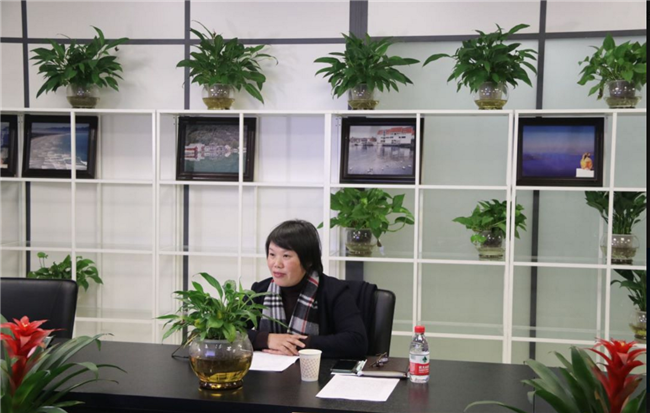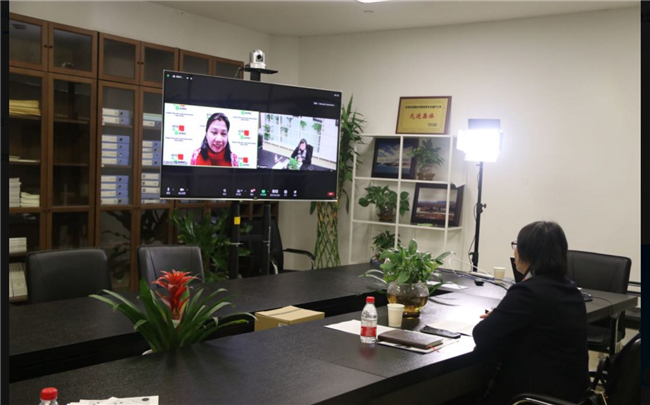CONTACT US
Secretariat of UCLG-ASPAC Committee on the Belt and Road Local Cooperation
Floor 18, Building C, Civic Center, 18 East Jiefang Road, Jianggan District, Hangzhou
secretariat-brlc@hzfao.gov.cn
Zip code: 310026



Hangzhou.com.cn Online Signing Ceremony between UCLG ASPAC and Guangzhou & Online Workshop on Women's Empowerment in the COVID-19 Era was held online on the afternoon of 17th December, 2020. Hangzhou was invited as a representative to share its experience in how to intelligently apply Smart City and big data technologies to epidemic control and prevention.
CHEN Junfang, Secretary of the Party Committee of Hangzhou Center for Disease Control and Prevention, made a speech titled “Apply Big Data in Response to COVID-19: Hangzhou's Practices and Prospect”, sharing the city's experience in this area.
According to CHEN, big data are mainly applied to the screening of close contacts and travelers from key areas. To help employers figure out in real time whether their employers were from high-risk areas or had any contact with confirmed cases to facilitate the resumption of work and production, Hangzhou started developing the health code on 6th February and tested it online on 11th February. The news was officially released on 12nd February and the promotion of the code throughout Zhejiang Province started on 17th February. Since then, the code has been widely applied in China.
Different types of health codes, designed for overseas travelers and the elderly and children with no smartphones, were later developed and promoted. Besides, the Health Code was linked to the citizen card, and health code application for the elderly and children was launched, realizing health code application assistance, authentication code scanning (card) and other functions, which have been applied in residential communities and schools for orderly resumption of schooling, etc.
CHEN added that Hangzhou stuck to three working mechanisms during the development and promotion of Health Code. First, concerted efforts citywide. Districts and counties subject to the jurisdiction of Hangzhou government are required to use unified health code in sync. Second, quick complaint resolution mechanism. Problems such as incorrect personal information and delayed update on code information after quarantine should be resolved in a timely manner. Third, data confidentiality and security mechanism. Information security and system platform should be planned, built, and implemented in a synchronized manner.
Making good use of “City Brain” (Smart City), Hangzhou will strengthen the health data desensitization and security maintenance, and enhance interconnections among Health Code, big data, artificial intelligence and other information technologies, to establish information sharing, regular analysis and early warning mechanism between disease control and prevention institutions and special venues like medical institutions, prisons, nursing homes, and pharmacies.
CHEN Yini, Vice Chairman of Guangzhou Municipal CPPCC, Co-chairman of UCLG ASPAC, and Chairman of the UCLG ASPAC Committee on Women in Local Governments, Bernadia Irawati, Secretary General of UCLG ASPAC, and representatives present at the meeting spoke highly of and deeply appreciated Hangzhou's experience in applying big data to the control and prevention of COVID-19, which they believed would play a positive role in the effective control of the pandemic.




Hangzhou.com.cn Online Signing Ceremony between UCLG ASPAC and Guangzhou & Online Workshop on Women's Empowerment in the COVID-19 Era was held online on the afternoon of 17th December, 2020. Hangzhou was invited as a representative to share its experience in how to intelligently apply Smart City and big data technologies to epidemic control and prevention.
CHEN Junfang, Secretary of the Party Committee of Hangzhou Center for Disease Control and Prevention, made a speech titled “Apply Big Data in Response to COVID-19: Hangzhou's Practices and Prospect”, sharing the city's experience in this area.
According to CHEN, big data are mainly applied to the screening of close contacts and travelers from key areas. To help employers figure out in real time whether their employers were from high-risk areas or had any contact with confirmed cases to facilitate the resumption of work and production, Hangzhou started developing the health code on 6th February and tested it online on 11th February. The news was officially released on 12nd February and the promotion of the code throughout Zhejiang Province started on 17th February. Since then, the code has been widely applied in China.
Different types of health codes, designed for overseas travelers and the elderly and children with no smartphones, were later developed and promoted. Besides, the Health Code was linked to the citizen card, and health code application for the elderly and children was launched, realizing health code application assistance, authentication code scanning (card) and other functions, which have been applied in residential communities and schools for orderly resumption of schooling, etc.
CHEN added that Hangzhou stuck to three working mechanisms during the development and promotion of Health Code. First, concerted efforts citywide. Districts and counties subject to the jurisdiction of Hangzhou government are required to use unified health code in sync. Second, quick complaint resolution mechanism. Problems such as incorrect personal information and delayed update on code information after quarantine should be resolved in a timely manner. Third, data confidentiality and security mechanism. Information security and system platform should be planned, built, and implemented in a synchronized manner.
Making good use of “City Brain” (Smart City), Hangzhou will strengthen the health data desensitization and security maintenance, and enhance interconnections among Health Code, big data, artificial intelligence and other information technologies, to establish information sharing, regular analysis and early warning mechanism between disease control and prevention institutions and special venues like medical institutions, prisons, nursing homes, and pharmacies.
CHEN Yini, Vice Chairman of Guangzhou Municipal CPPCC, Co-chairman of UCLG ASPAC, and Chairman of the UCLG ASPAC Committee on Women in Local Governments, Bernadia Irawati, Secretary General of UCLG ASPAC, and representatives present at the meeting spoke highly of and deeply appreciated Hangzhou's experience in applying big data to the control and prevention of COVID-19, which they believed would play a positive role in the effective control of the pandemic.